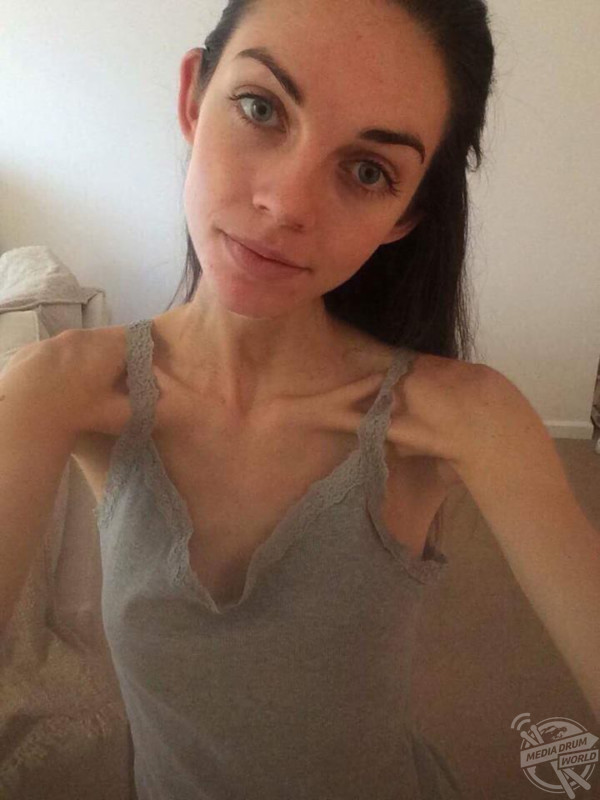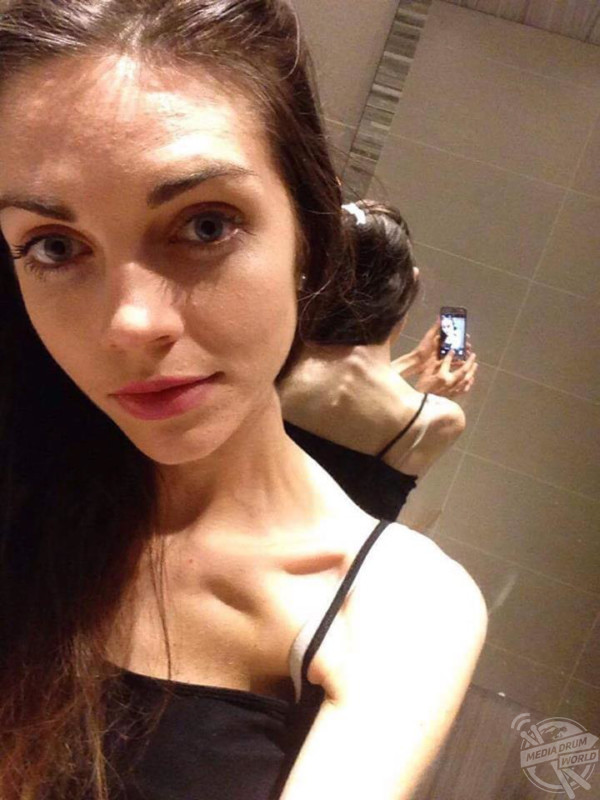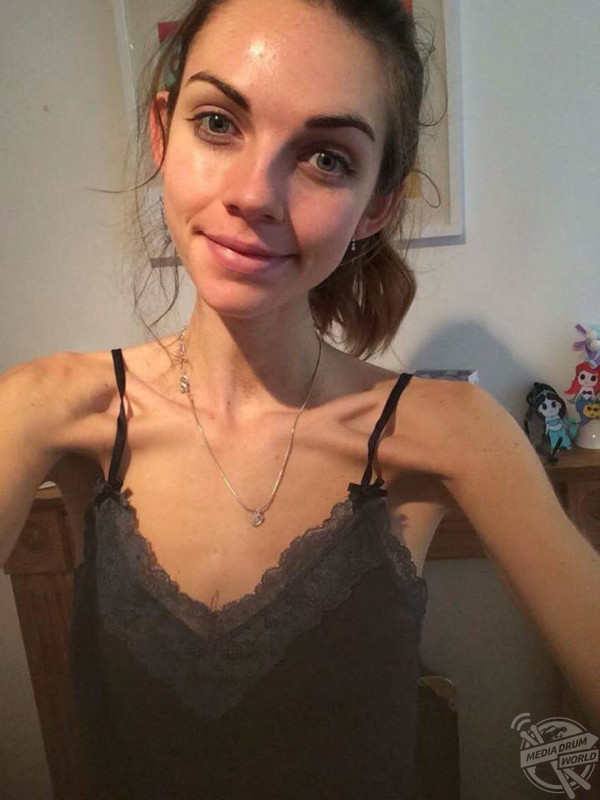By Liana Jacob
THIS ONCE six-stone woman wanted to be the ‘skinniest in the graveyard’ until reality struck when medics warned her heart could stop any minute.
Singer/songwriter, Lydia Hannah Davies (21), from Dorset, UK, was just 13-years-old when she began dieting due to changes to her body while she was going through puberty. Her body dysmorphia led her to believe she was ‘massive’ and that she would be a ‘waste of space’ if she gained weight. At one point she was too terrified to clean her teeth because of the calories she believed were ingested from toothpaste.

Lydia Davies / MDWfeatures
At the age of 18, Lydia’s condition got worse. She became obsessed with exercise and would run at least six-miles-a-day every day no matter what, even when she felt dizzy or passed out. She consumed as little as 500 calories a day which meant her weight decreased to just 6st and she was a UK size four.
In 2017, her doctors told her that if she didn’t recover her heart could stop at any minute, and this spurred her on to begin her journey to health. With the help of the outpatient services at Kimmeridge Court in Poole, she began eating again and decided not to let exercise or diet control her life anymore. She is now a healthy 10st 6Ibs and UK size 10.

Lydia Davies / MDWfeatures
“Being so underweight made all of my emotions numb. I couldn’t love or be happy about anything, I just wanted to die,” Lydia said.
“I felt that being ‘anorexic’ was my only talent and I had nothing else going for me in life. I remember my mum breaking down that she was scared for my life.

Lydia Davies / MDWfeatures
“I shouted, ‘I don’t care, I want to be the skinniest in the grave yard’ – the fact that I genuinely thought this still haunts me today.
“I had a file of ‘thinspiration’ on my phone; I’d look at it whenever I felt hungry, to stop myself from eating.

Lydia Davies / MDWfeatures
“I would also inflict pain upon myself when I was hungry in order to punish myself for almost ‘giving in’ to food.
“I would only allow myself to eat at certain times of day and would have terrible panic attacks if someone placed food other than my ‘safe foods’ in-front of me.

Lydia Davies / MDWfeatures
“I would weigh everything I ate obsessively. I was terrified of anything and everything. I was even afraid of fruit.
“I wouldn’t allow myself to drink anything because that would be ‘wasted calories’ and I was worried that water would make me look fat, so I was constantly de-hydrated.

Lydia Davies / MDWfeatures
“For a few months I was even too scared to brush my teeth because I couldn’t find on the internet how many calories were in my toothpaste.
“My brain had convinced me that weight gain was the worst possible thing that could happen to me, I thought that if I gained weight then no one would love me or care about me and I’d be a waste of space.”

Lydia Davies / MDWfeatures
Lydia checked into an outpatient clinic in 2017 that helped her get back into a healthier routine of eating, but with her weight continuing to drop rapidly, she was transferred to an intensive non-residential (INR) clinic, which meant that she had to attend the hospital almost every day for five months.
Initially Lydia rejected the treatment, but after a sit down with her doctor who informed her that her heart could potentially stop at any minute, Lydia decided that she would try to recover.

Lydia Davies / MDWfeatures
“I started seeing outpatient services at Kimmeridge Court. Unfortunately, I was still rapidly losing weight and was struggling to recover at home, so I was referred to the INR,” Lydia said.
“This meant I had to attend the hospital almost every day, all day, where I would have all my meals provided and supervised and I would be watched to ensure I was physically resting.

Lydia Davies / MDWfeatures
“We had therapy sessions and cooking sessions. At first, I refused to go to the day service because the thought of eating other foods terrified me to the point of passing out, but I eventually felt that I would try it, not for myself but for my family.
“The eye opener for me was when my family and I were told that my heart could potentially stop at any minute.

Lydia Davies / MDWfeatures
“Something clicked in me and I decided to fight this illness as hard as possible one last time. Anorexia took my teenage years from me and I was determined to fight for my life back.
“Kimmeridge saved my life. The staff were incredibly patient and understanding and I received incredible aftercare too. I can’t thank them enough.”

Lydia Davies / MDWfeatures
Lydia’s new outlook on life and eating motivated her to share her journey on Instagram to 1.4K followers.
“I run an Instagram account for anyone struggling with mental health (@lills_tastes_life). It started out as a diary for me to vent and seek help from others, but it has turned into a page which I use to communicate with and help others struggling,” she said.

Lydia Davies / MDWfeatures
“I try to inspire anyone who visits my page to see that although recovery is not linear and will be different for everybody, I truly believe that a full recovery is possible.
“I no longer weigh foods, count calories or exercise obsessively. I simply enjoy food, enjoy new experiences and love life.

Lydia Davies / MDWfeatures
“My family life has never been better, I put my parents through hell and for that I am so sorry, but it has brought us all closer and I love and appreciate them with all my heart.
“Two years on, however, I am the heaviest yet happiest I have ever been in my life. Weight does not equal happiness or define me.

Lydia Davies / MDWfeatures
“I realised I was created for a bigger purpose than to lose weight and that my identity is not in my appearance but in the woman God created me to be.
“With an eating disorder, you can be any weight and be very sick, because weight loss is just one symptom of the mental illness.

Lydia Davies / MDWfeatures
“Things were hardest during the point of my recovery where I had just reached the minimum healthy BMI for me.
“This is because with the weight gain my brain was powering up again and all of my negative emotions came flooding back.

Lydia Davies / MDWfeatures
“Although I looked physically well, mentally this was the worst time. This is the point where many people relapse because their brain hasn’t caught up with their body. It is very difficult.
“The most important piece of advice I can give to anyone who thinks they may have an eating disorder/obsessive exercise behaviour is to seek help as soon as possible.

Lydia Davies / MDWfeatures
“I want the public to know that anorexia has nothing to do with vanity or being ungrateful or spoilt, it is a serious mental health condition which no one chooses.
“I want sufferers to know that they are not alone and one day they too can be free and flourishing. I am so excited for you.”

Lydia Davies / MDWfeatures









